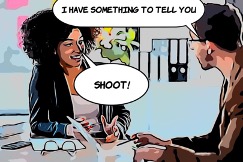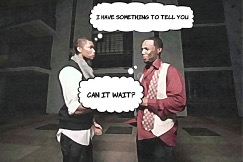There are different ways to respond when someone says they’ve got something to tell you.
Usually, it’s natural to show curiosity if you’re interested in what they’ve to say. And, it’s also natural to wonder or worry about what they’ve got to say.
Expressions like, “alright,” “shoot” and many more, are different ways you can express your interest or curiosity.
However, how do you respond when you are not interested in what they’ve got to say? Surely, you can’t always be enthusiastic in listening to someone, especially if you’re busy at the moment or not just feeling it.
So, in this article, I’ll be dealing with the different ways you can respond when someone says they’ve got something to tell you. Whether you’re interested or not, you’d know how to respond.
20 “I Have Something to Tell You” Responses
When someone says they’ve got something to tell you with a very serious or stoic expression, it’s natural to worry.
However, it’d be best if you keep your cool and do not assume the worst. The best response is to let them know you’re ready to listen or let them know when you’re not ready to listen.
That being said, here are 20 responses to “I have something to tell you.”
- Alright
- Yea, sure
- Shoot!
- Go ahead
- Okay
- Perfect
- Okay, what have you got?
- Share some gossip!
- Hit me
- What’s up?
- I’m all ears
- Bring it on
- You always do
- Please, not now
- I’m afraid I can’t listen now. I have got things doing
- Can we do this some other time?
- Is it urgent?
- Can it wait?
- Will it take time?
- I’m not in the mood
Alright
“Alright” is one of the natural ways of responding when someone says they’ve got something to tell you.
It’s a response that you don’t have to think about, as it shows that you’re ready to listen to the speaker.
When you say “alright,” it means you’re ready to quit what you’re doing at the moment and focus your attention on the speaker.
With this response, the speaker would be encouraged to go on, given that you’ve given them the go-ahead.
In addition, this word is both a formal and casual way of responding. You can respond this way to a friend, your colleague at work, or a superior.

Yea, Sure
Another way of responding that’ll show that you’re ready to listen is “yea, sure.” This phrase works like the above, in that, it tells the speaker that you’re ready to listen.
“Yea” shows that you acknowledge their statement and “sure” lets them know they’re free to go ahead with whatever they’ve to tell you.
In addition, this response is like an assurance that’d boost the speaker’s confidence, encouraging them, in case they’re worried or hesitant.
For instance, if the person meets you with a worried tone or expression, using this response accompanied by positive body language should put them a little at ease.
Furthermore, this is a casual way of responding to your friend or anywhere out of a formal setting.
Shoot!
“Shoot!” is another perfect response to use. Just like the above expressions, it’s a great way of telling the speaker that you’re ready to listen to whatever they’ve got to say.
You use this kind of response with your friends, showing your enthusiasm in hearing whatever they’ve on them.

Go Ahead
This is another gentleman’s way of responding when someone says they’ve got something to say. It’s a straightforward way of telling them to start speaking.
Just like, “yeah, sure,” saying this it’s an encouraging reply that can set a worrying speaker at ease.
Also, this response can fit a work environment, as well as a casual setting.
Okay
“Okay” is another word you can use to reply to someone who tells you they’ve got something to tell you.
It does the same work as “alright,” encouraging the speaker that you’re ready to listen, and so, you should focus your attention on them.
In addition, you can always use it in a casual or formal setting; it’ll fit adequately.
Okay, What Have You Got?
Another way of responding to someone who needs you to listen to them is with this question.
Here, you didn’t stop at “okay,” which tells them they can go on with what they have, but asking what they’ve got, makes it easier for them to speak.
This question is a better way of assuring them that they’ve your full attention.
It’s a good way of replying to someone who sounds anxious.
Perfect!
“Perfect!” is another reply you can use when someone says they’ve something to say to you.
It expresses excitement and curiosity to hear what they’ve got.
This is the kind of reply you use with a friend or colleague who’s known for bringing you the latest gist.
In addition, this word expresses not only your excitement about what they’ve got to say but also shows the bond you both share.
Share Some Gossip!
This is another reply that shows your delight in what the speaker has got to say. You use this reply with friends and with your gossip mate.
Using this reply shows how free you’re with the speaker and your willingness to hear what they’ve got.
Also, this is the kind of response you use when the speaker shows some excitement about the news they’ve got, which would imply that it’s nothing serious.
Hit Me
This is another excellent way to reply to someone who’s got something to say to you. It shows your readiness to listen to the gist they’ve got.
Also, this is a reply for your friends or gist mate.
What’s Up?
Here, you’re also willing to listen, that’s why you’re asking what’s up. Also, it’s a casual way of responding to anyone outside a formal environment.
In addition, using this expression is a good way of showing concern about the speaker and what they’re about to tell you.
When someone who’s worried comes to say that they’ve something to tell you, saying “what’s up” is the same as asking what the problem is.
So, this is a response that shows concern, letting the speaker know that you’re ready to give a listening ear to what they’ve got to say.
I’m All Ears
This is another way of letting the speaker know that you’re ready to listen to what they’ve got.
It’s a gentleman’s response that you can use with a friend or in a formal environment.
Also, it assures the speaker your full attention, and that means, stopping whatever you’re doing temporarily to listen to them.
Bring It on
This is a direct response that tells the person to go ahead with speaking, that you’re ready with whatever they have.
Here, you’re being casual. So it’s a nice response for a friend. Also, it’s a good way to respond to someone hesitant to speak.
For instance, if you notice the speaker shows fear, you can give this reply to let them know they’re free to speak to you.
You Always Do
This is the kind of response you use with a friend. It’s a reply for someone who’s always telling you some story.
This kind of reply doesn’t directly express interest in listening or curiosity to find out what they’ve got to say.
Therefore, it’ll depend on your tone and body language to let them know what you want.
So, you can use this response casually, as a funny reply to a friend who’s always telling you things. Also, you can say this statement when you’re not particularly interested in listening.
Please, Not Now
Now, this is a response that shows that you’re not ready to listen to what the speaker has got to say.
Sometimes, you may not be ready to listen to anyone; whether your friend or a stranger.
It could be that you’re busy at the moment or you’re not just in the mood for one of their gossip.
When this is the case, this is the response you can give. However, this reply is best suited for your friend whom you know may likely be in for some gossip.
If it’s a stranger, who politely approaches you for the first time, you might want to wait to know if it’s important first.
I’m Afraid I Can’t Listen Now. I have Got Things Doing
This is another great way that you can respond when you can’t listen to someone who has got something to say at the moment.
It’s a polite response that will work perfectly in a formal environment and even in a casual setting.
In addition, giving this reply would make it easier for the person to ask for your free time.
Can We Do This Some Other Time?
Here, this reply shows that you are not ready to listen to the speaker. However, it also shows your willingness to hear them out some other time.
This is a kind way of responding, as it offers the speaker the chance to come back with the information they’ve got.
You can always say this to your loved ones when you’re not free to listen to them, and also ensure you keep to the rescheduled time.
Is It Urgent?
This response indicates that your availability depends on how important what they’ve got to say is.
Usually, people use this response when they’re busy, but can also create some time to listen to you if it’s important.
So, you should use this response when you can spare some minutes out of your time to listen to someone with some important information.
Saying this offers the person an opportunity to ask to return to speak to you if they think they can wait.
Can It Wait?

This is another response that’ll work when you can offer some minutes to listen to an urgent matter.
Although you may be very busy with something important, it’ll be nice to give someone attention when they come with something that needs urgent attention
But, you wouldn’t know it’s urgent if you don’t respond appropriately. So, instead of chasing them with a response that you’re too busy, you can’t wait to know if it can wait with this reply.
Will It Take Time?
This is another response that’ll work when you can attend to very important matters.
When someone walks up to you and says that they’ve something to tell you, you should ask this question if you’ve got a few minutes to spare if you’re busy.
Asking this question instead of saying you’re busy outrightly, shows you’re concerned.
I’m Not in the Mood
This is the kind of response you use for a friend. When you’re not ready to listen; probably you’re in a bad mood, this response can work to convey how you feel to your friend.
When they hear this response, they’d want to know what’s wrong if they’re a concerned friend.
End Note
When people tell you they’ve got something to tell you, you can respond in different ways to express yourself.
If you’re ready to listen to them, your response should encourage them to go on with what they’ve got.
Also, you should accompany this reply with positive body language to give them full attention.
However, if you’re not ready to listen, you can always let them know, and also offer opportunities for them to return to talk later.
Whether you’re busy or you’re not in the mood to listen, you can politely respond to make them feel less disappointed in the end.